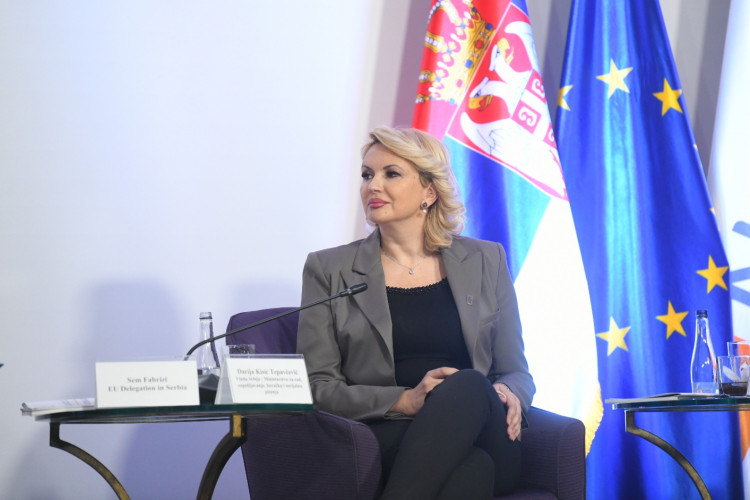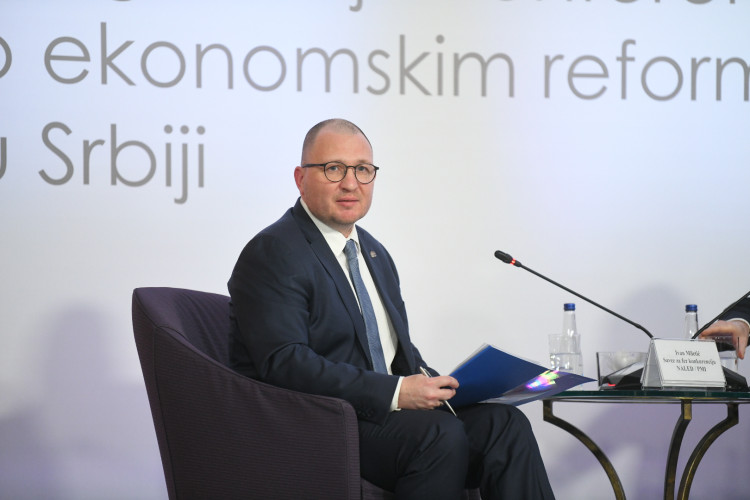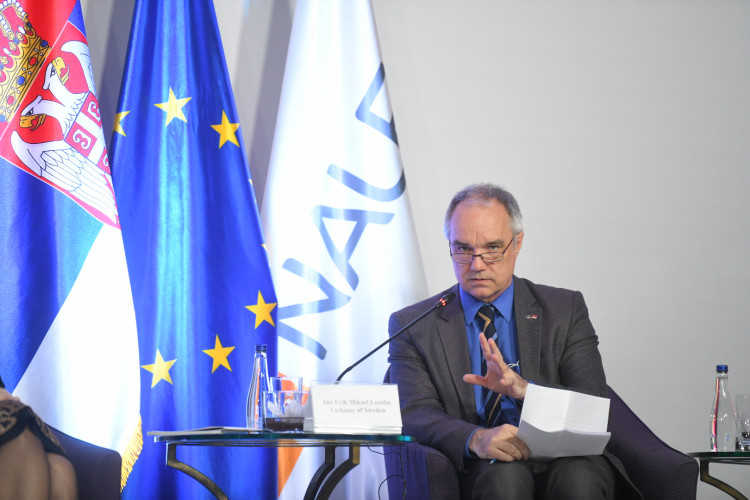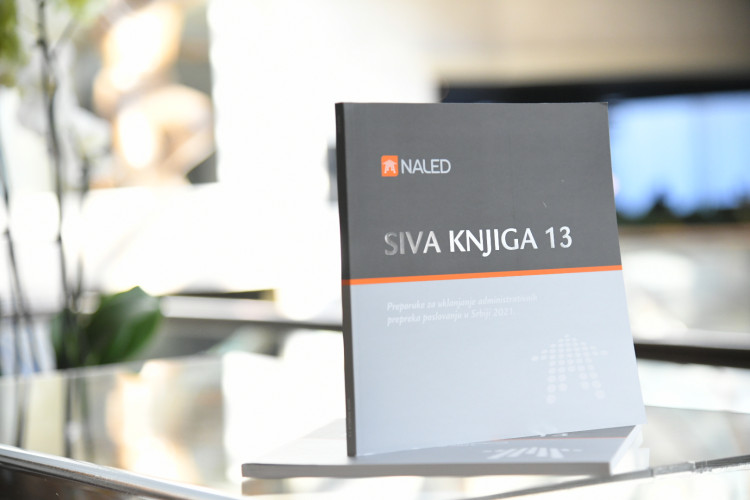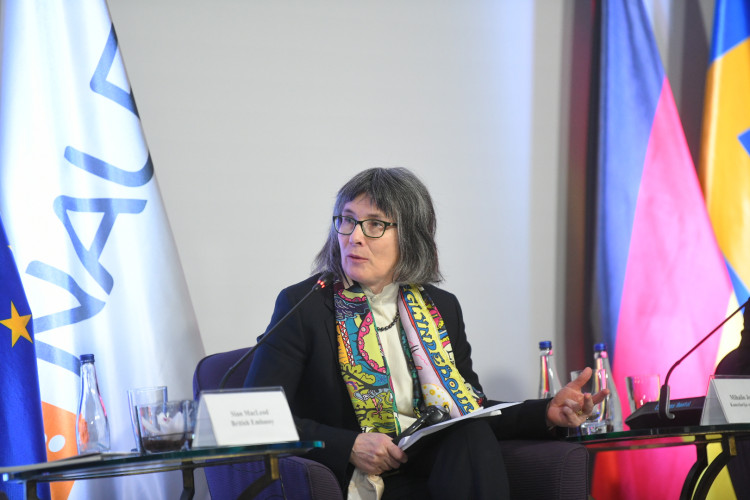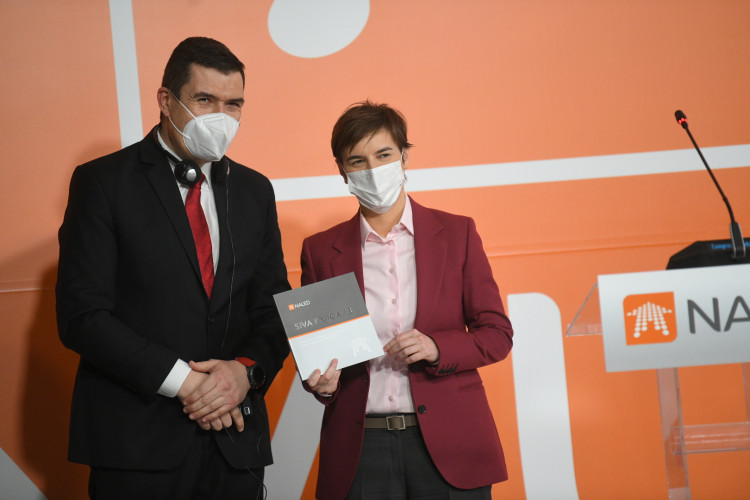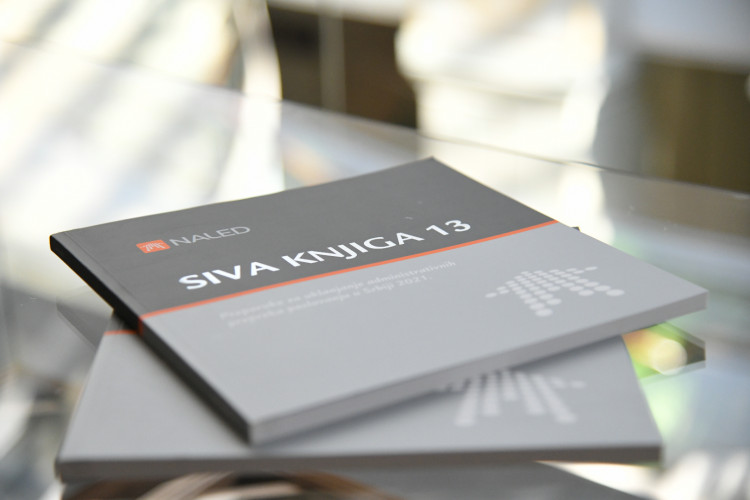NALED presented the Grey Book and 100 recommendations for better business conditions
Establishing an electronic health record, improving the water treatment system and abolishing the conversion fee – these are the new priority recommendations of NALED's Grey Book of bureaucratic procedures. The 10 most important initiatives also include the reduction of tax burden for businesses, the abolition of paper payment slip, the establishment of an electronic registry of non-tax levies, an online registry of agricultural holdings and subsidies (eAgrar) and a unified certificate of paid taxes.
Solving the priority recommendations would help speed up the remediation of negative effects of the pandemic and improve the conditions for business and investment, it was concluded at the presentation of the 13th annual edition of this publication.
NALED's traditional conference on economic reforms estimated that the reform pace had dropped, though expectedly, in a year marked by the Coronavirus pandemic and the concern for citizens’ health and job preservation. 13 recommendations of the previous Grey Book have been resolved, of which two completely and 11 partially. This indicates the need for institutions to invest more effort in 2021 towards providing complete, rather than partial solutions.
- I am proud to point out that, despite the circumstances of the pandemic, 2020 was the year of digitalization. We have shown how much we can do, first of all, by establishing an efficient information system for vaccination management and organization of immunization, so that in less than a month, more than a million citizens received the vaccine. We have also launched electronic public procurement, as well as electronic delivery of cadastre decisions and tax decisions for flat rate entrepreneurs. And when I look at the 10 priority recommendations of Grey Book 13, I see that the common denominator for most of them is digitization. I can promise that we will do our best to solve most of them - said the Prime Minister of Serbia Ana Brnabić, thanking NALED for its long-term partnership.
- Grey Book 13 symbolically brings 13 new recommendations for the Government of Serbia, and what distinguishes the new edition from the previous ones is the 15 recommendations that we marked with the so-called Covid-19 badge, in order to point out the most common administrative obstacles that citizens and businesses face during a pandemic. In light of the current situation, these recommendations primarily relate to the need to digitalize and improve the health system, regulate work from home and other flexible forms of employment and reduce the tax burden on the economy - said the President of the Executive Board of NALED Dejan Đokić.
According to him, among the implemented recommendations in 2020, the one that particularly stands out is the introduction of electronic delivery of cadastre decisions through the eGovernment Portal, which will ease the work of almost half a million citizens who trade in real estate every year, as well as the introduction of electronic public procurement and the portal which already facilitated 11,000 procedures, in just six months. Important progress was also made with the passing of the new Law on Fiscalization and the introduction of eInvoices, and the announced expansion of online registration of seasonal workers in agriculture to occasional and auxiliary workers in household jobs, tourism, and construction.
The Ministry of Finance had the most resolved recommendations, while important recommendations were also resolved by the Ministry of Construction and the Ministry of Labor. The Ministry of Health contributed by preparing a draft plan for the optimization of health care institutions and stopping the spiral of debts of state pharmacies, and the Ministry of Trade and the Ministry of Public Administration through further development of eGovernment. Important contribution was also provided by the Office for IT and eGovernment, the Republic Geodetic Authority, the Tax Administration and other relevant institutions.
Each year, the Grey Book brings 100 recommendations for cutting the red tape, and what sets it apart from other publications are the proposed solutions for each of the administrative procedures that need to be improved. From the first edition of the Grey Book until today, 131 recommendations have been fully or partially resolved, out of a total of 268 that have been included in this publication.
Key international organizations and donors who provided the greatest support to the reforms also spoke at the conference, including the Head of the EU Delegation to Serbia, H.E. Sam Fabrizi, German Ambassador H.E. Thomas Schieb, Ambassador of Sweden H.E. Jan Lundin and the Ambassador of the United Kingdom H.E. Sian MacLeod. They talked with Serbian Deputy Prime Minister Zoran Mihajlović and Minister of Labor Darija Kisić Tepavčević about further priorities and measures to support the Serbian economy.
Special recognitions awarded for contribution to reforms
Within the 13th annual conference on economic reforms, NALED traditionally awarded special recognitions to prominent individuals and teams in public administration who, in cooperation with NALED, made the strongest contribution for the adoption of the Grey Book recommendations, but also for overcoming the obstacles and challenges imposed by the pandemic.
State Secretary of the Ministry of Finance Slavica Savičić received recognition for the exceptional contribution to the improvement of the regulatory framework for doing business in Serbia and the creation of economic measures to support the economy during the Covid-19 pandemic. The Director of the Office for IT and eGovernment, Mihailo Jovanović, also deserved recognition for his exceptional contribution to the establishment of a unique system for effective immunization against Covid-19 and the introduction of new electronic services for citizens and businesses on the eGovernment Portal.
The team recognition for the joint contribution to the improvement of the business environment and overcoming the crisis caused by the Covid-19 pandemic went to Goran Stamenković, Assistant Minister of Health, who coordinated the inspection of anti-pandemic measures, Milan Pašić, Assistant Minister of Education, for the improvement of online classes, Danijel Nikolić, Assistant Secretary-General of the Government, who played a central role in providing donations for the health system, and Stefan Badža, advisor in the Prime Minister's Office, for removing administrative barriers for doing business during and after the state of emergency.
NALED has traditionally awarded special recognitions to media representatives. Ilija Cerović, Acting Director of Television Belgrade and Editor-in-Chief of the educational and scientific program of RTS, for the organization of online classes in an extremely short time and cooperation with NALED on implementing the national competition "Magic is in the hands of teachers", as well as Aleksandar Milošević, editor of economy in the daily Danas, for quality public reporting on measures and initiatives to improve the business environment and overcome the crisis caused by the Covid-19 pandemic.

